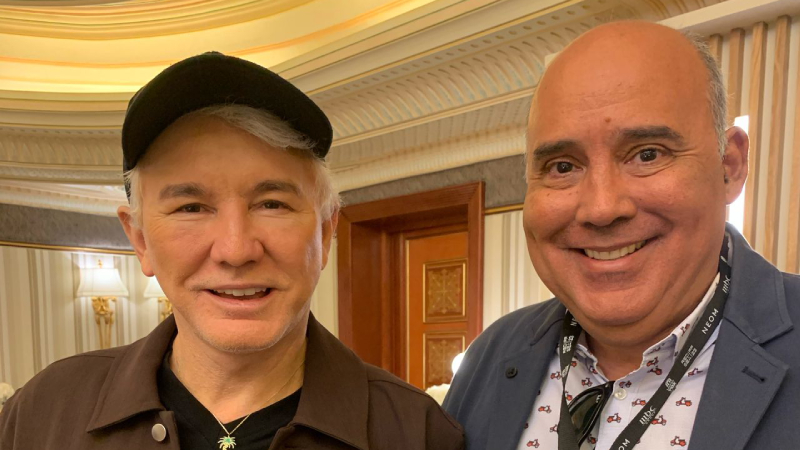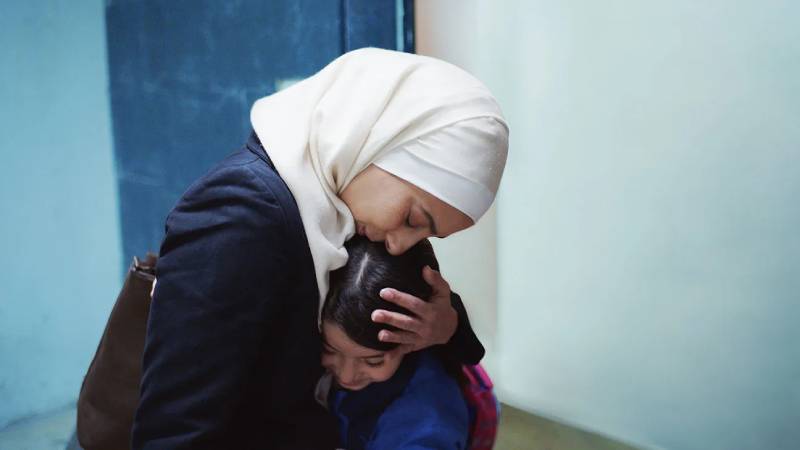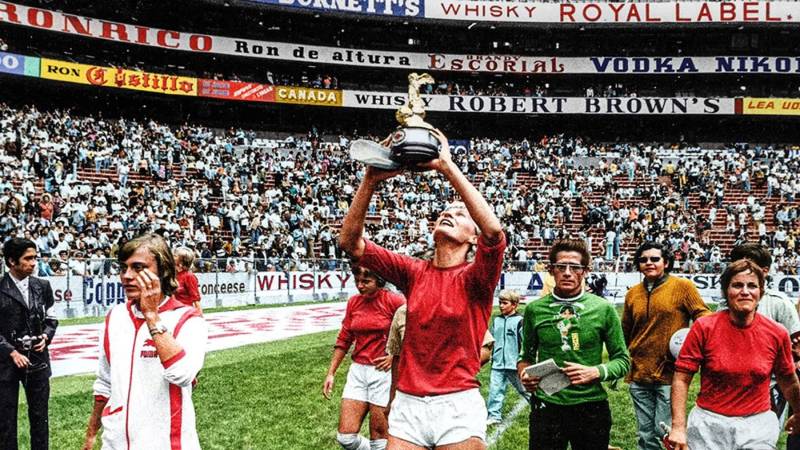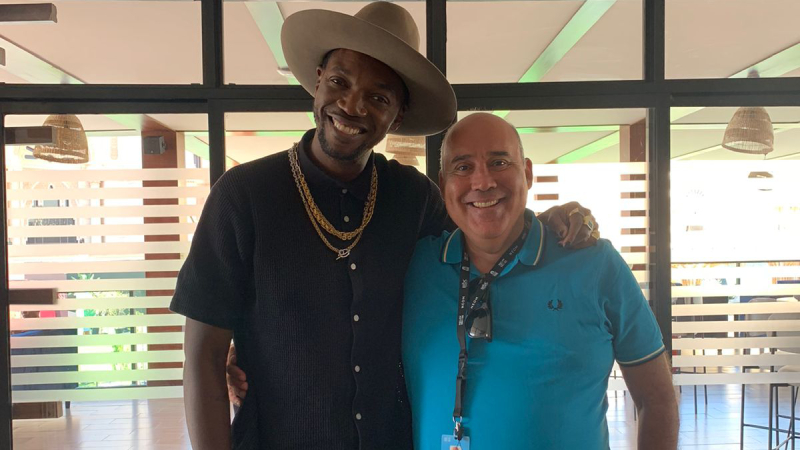Aussie maestro Baz Luhrmann was omnipresent during the third edition of the Red Sea Film International Festival (RSIFF). He took his job as president of the jury very seriously and could be spotted in every screening of the films in competition, held at the impressive Vox cinemas, in Jeddah.
Baz also found time to moderate a talk with fellow Aussie actor and friend Chris Hemsworth, known mainly for his role as a Scandinavian God called Thor, in the Marvel franchise . But that’s another story. Luhrmann’s artistic streak is easily recognisable. He has reinvented the musical genre with glitzy gems like Strictly Ballroom (1992), Moulin Rouge (2001) and his more recently Elvis (2022).
He was also very moved by the films he saw at the RSIFF, especially the ones that focused on women’s rights and personal dramas. He is even considering making his next project in Saudi Arabia. I sat down with Baz, and a small group of international journalists, at the Ritz-Carlton, the heart of the Festival. We discussed why film musicals should resist, his passion for Lawrence of Arabia (David Lean, 1962), and his surprise with the current state of Arabian movies.
You can find out about the movies that Baz and his jury picked by clicking here.
…
.
Duda Leite – In 2021, you said that you wanted to bring Hollywood to Australia. How is that going?
Baz Luhrman – I don’t doubt that was my sentiment. I would never use Hollywood to Australia, maybe I was being flippant. But what I am not flippant about is that, we are a small country and I am devoted to it. And in a million years, if I would have said that I would end up in the Gulf Coast, I would probably say not. I had to make Elvis in Australia, and it was great. My kids were full of love for the environment. And the state money was behind it. The federal government was behind it. And Chris Hemsworth, who has just arrived this morning, lives just down the road. So if the question is: “am I still devoted to it?” Yes. We live around the world. We have a house there. That would be our prior base. Somewhere between there and Paris. (laughs)
DL – During the opening of the Red Sea Film Festivalk you’ve mentioned that you would be available to make a film here.
BL – I was not being fastidious about that. This is also a small country. We make a lot of big movies in Australia. But we make a lot of small films in Australia, like when I did “Strictly Ballroom”. We have a lot of weird, strange small independent movies being made there. But here, when I came out to do my own investigation six months ago, I went to the Film Alula Studios being made here, and this was 6 months ago. They might be finished now. But they were really serious good soundstages. They are looking at the right things at rebates, because they’ve got to compete. It’s a real thing. You can go to Canada and get a rebate. You don’t have to invest a lot of money, you just don’t pay taxes. Just like any other industry, if you bring 100 million dollars in, it’s good for the environment. So, to answer your question: absolutely. I’ve always been interested in the region, ever since as a kid. One of the first films I saw as a kid was Lawrence of Arabia. And since then, I have always been magnetically drawn to this part of the world. My journey started six months ago, it was such an eye opener. Because, when you are outside, your information comes only through clickbait and snapshots. Some of it may be true, but what was so revelatory is when you come here and realize that 75% of the population is under 35 years old. So I met a lot of young female filmmakers. And some of whom had just pitched their films, some of the issues in their movie were irrelevant when they finished the movie. So quick is the change. So you get the energy of these young filmmakers. They want their future. And they’re gonna have it.
DL – It’s true that they are building these studios, but they are not allowed to have unions here. How would you deal with that?
BL – It’s a good question. I’ve made Romeo + Juliet (1996), and it’s my only film that I made outside of Australia. I made that one in Mexico. I would have to jump into the details of this. But if I am going to make a show here – we call them shows – I know I’ll be able to bring that to the table certain requests. What we did in Mexico is that we brought some of the key people to the project, but part of the deal was to work with some local emerging talents. Obviously the crew, and one of the young guys there, ended up having a pretty good career. He won a couple of Oscars. It was Alfonso Cuarón. He used to sit and hang out on the set of Romeo + Juliet. And we were laughing about that. So the word I like to use is cross-fertilisation. Our film wouldn’t exist if it wasn’t the cross-fertilisation between our creatives and our communities. Whenever we are. As far as the union question, that requires further examination, because I really don’t know how that works here. Let’s just wait and see how it goes. They had 35 years without being able to go see a movie. There were no movie theatres here five years ago. Now, I’ve seen movies… When people talk to me about Saudi, and how they see it from outside, I always tell them: go see the movies that I saw. In the last few days, with diverse audiences, from diverse backgrounds. Go see the movies. See how they’re made, see the subject matters. And then come back to me, and I’ll talk to you. The stories answer the questions.
DL – Are you confident that cinema and culture can change things, rather than politics?
BL – Before I came, I really did my investigation. I wasn’t manicured. Sure, people were taking me to places. There was always some trepidation, from being here, I am doubling down 100%. I am 100% sure of how important this festival is. Because in a world where we are being fed by politics, we are absolutely being fed by violent solutions. Storytelling voices humanize them. And what I’ve seen on the screen, is the humanising of things that we are saying intellectually, or politically. But when you see the stories, you see the people. No person’s pain is less than another’s. And I am confident, no wrong world. I am absolutely sure that we have to double down on stories being streaming or film. Let’s say films, because film as an art takes some time to dictate. Particularly the young voices. I’ve seen some stuff, with some similar themes, no matter the genre, and I am like: “hang on, this is a pattern here”. I didn’t know that. And some of the topics are very clear that this is a problem. When you see these human beings, if I say: “a woman”, some of them have these amazing female performances. Amazing. And how these good people, for no fault of their own, lack the ability to solve the simple things. And at the same time, they’re really entertaining. It’s some really good filmmaking. That’s exciting.

DL – Every now and then, people like to say that musicals are dead. And you’ve proved them wrong once again with Elvis. Why do you think musicals are so resilient?
BL – Actually they’re resilient because if you look at them, every period found his style of movies. Even in the 1970s, a period where the New Hollywood was happening, if you look at “Saturday Night Fever” (1977), it’s a shocking movie. There are things in that movie that you would not be able to have in a film today. Shocking! There is language that you would not be able to use today. There is a rape scene that you could not have in a movie today. You would think it’s a movie about disco dancing, actually it’s about this group of macho males, and the toughness of the environment they’re in. And aspiring to get over that and the dancing is part of it. Musicals in the ’70s tended to have some realism about them. Like in “Cabaret” (1972), where all the musical numbers had to be on stage. Every period finds its language. And the thing about musicals is that people think they’re easy to make, and they are incredibly difficult to make. But if they work, they never go away. I did “Moulin Rouge” 20 years ago, and now it has 6 productions around the world in the theater.
DL – This year there were quite a few refreshing Australian movies, like Limbo (Ivan Sen, 2023), and The New Boy (Warwick Thornton, 2023). And a couple of these films deal with the native people of the Western coast. Do you think that the films being made in Australia are changing and facing this part of history?
BL – I just met a new world of faraway downs. It was when I made the movie Australia (2008) many years ago. And I shot 2.5 million of shooting, but I wasn’t unable to finish it the way I wanted, because I was doing in a more epic way the story of an indigenous child. And it was a story warped up in a melodrama fashion. The core of the story were these native children that were forced to be put in mixed races families. That was the center of the story. What was so remarkable, and it was the center of the story, one of the filmmakers that was working in that movie, was Warwick Thorton, who made The New Boy. And a lot of outsiders don’t understand that the issue of this native generation is such a profound guide in the history of our country. And a history not told. And that’s what I thought when I did Australia, and I wanted to do it in a deeper way. [Baz just released a re-edited version of the movie with some extra footage as a TV series].
What is so great is that at that time, there were some indigenous filmmakers, but now, there is a whole new scene. I was recently listening to the soundtracks of all these young indigenous pop stars doing their music. I think it might be a good comparison with the way things are happening here in Saudi. The fact that only a few years ago one of the first heroes of the Saudi cinema was a woman (Haifaa Al-Mansour, director of 2012’s Wadjda), and she had to direct her first movie from inside a car. And the film became a hit. And she’s become an icon. And there is a new generation of women directors, some of them I’ve met. And it’s interesting as female directors are leading the charge in this new scenario. And that’s part of I am calling a Repo effect. I think you can never do enough. But what I think it’s great is a lot of those indigenous first nations directors in Australia, who are friends and whom I know well, they’re just great filmmakers. They are not being locked in.
DL – Haifaa Al Mansour moved to New Zealand. So I guess there are limited opportunities here. And especially for women who are not afraid to speak up.
BL – Very good point. Because, you know, it’s such a schizophrenic thing, I am not sure that is the right word. From one hand, there are all these young female filmmakers, who are a driving force, but who are constrained. Having said that, your point of her moving to New Zealand is a very good one. Because for us, back in the day as Australians, right? We would make a really good movie, like Peter Weir, or Gillian Armstrong, a great example. And then, they would go off to Hollywood. There just wasn’t the scale or the infrastructure for the industry growth to stay in Australia and make a big film. And as we grew, we can now have people like Chris Hemsworth, who can make some of the biggest productions, and live just down the road. It’s gonna take time. I am not sugarcanning the issues. I never had to sit in a Jury and see four films a day, it takes work, but it’s so nourishing. To be blunt, a lot of the films I’ve seen, the issue of women’s rights, and just the ability to do the simple things, things that we would take for granted, it’s dealt with in those films. And what is great is a female story. I can only say I have absolutely no doubt that supporting the Red Sea Film festival and the diversity of their audiences from this environment of the whole area, it’s got to be a good thing, Because certainly politics are not going to be much help.
DL – You mentioned that you have this desire of making a film here, what would it be about?
BL – I didn’t say I have an idea. I’ve come and seen the environment… Could I see myself making a film here? Absolutely I could. But that is a very different issue to what I was saying, that is the ability of anyone – out of the agenda – to tell their story. That’s all it’s been said. I’m not saying it’s done. Neither is the empowerment of the First Nations in Australia. There are huge and massive leaps. There is a lot more to do. More to do. But you’ve got to start somewhere. Instead of not doing nothing.
…
.
Baz Luhrmann is pictured at the top of this interview, image by Daniele Venturelli. He is pictured alongside Duda Leite below, image by Duda Leite.











